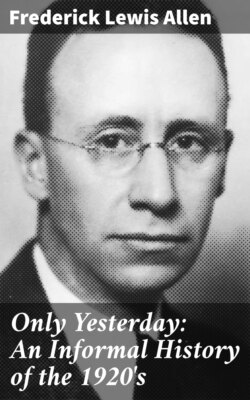Читать книгу Only Yesterday: An Informal History of the 1920's - Frederick Lewis Allen - Страница 4
На сайте Литреса книга снята с продажи.
PREFACE
ОглавлениеTable of Contents
Obviously the writing of a history so soon after the event has involved breaking much new ground. Professor Preston William Slosson, in The Great Crusade and After, has carried his story almost to the end of this period, but the scheme of his book is quite different from that of mine; and although many other books have dealt with one aspect of the period or another, I have been somewhat surprised to find how many of the events of those years have never before been chronicled in full. For example, the story of the Harding scandals (in so far as it is now known) has never been written before except in fragments, and although the Big Bull Market has been analyzed and discussed a thousand times, it has never been fully presented in narrative form as the extraordinary economic and social phenomenon which it was.
Further research will undoubtedly disclose errors and deficiencies in the book, and the passage of time will reveal the shortsightedness of many of my judgments and interpretations. A contemporary history is bound to be anything but definitive. Yet half the enjoyment of writing it has lain in the effort to reduce to some sort of logical and coherent order a mass of material untouched by any previous historian; and I have wondered whether some readers might not be interested and perhaps amused to find events and circumstances which they remember well--which seem to have happened only yesterday--woven into a pattern which at least masquerades as history. One advantage the book will have over most histories: hardly anyone old enough to read it can fail to remember the entire period with which it deals.
As for my emphasis upon the changing state of the public mind and upon the sometimes trivial happenings with which it was preoccupied, this has been deliberate. It has seemed to me that one who writes at such close range, while recollection is still fresh, has a special opportunity to record the fads and fashions and follies of the time, the things which millions of people thought about and talked about and became excited about and which at once touched their daily lives: and that he may prudently leave to subsequent historians certain events and policies, particularly in the field of foreign affairs, the effect of which upon the life of the ordinary citizen was less immediate and may not be fully measurable for a long time. (I am indebted to Mr. Mark Sullivan for what he has done in the successive volumes of Our Own Times to develop this method of writing contemporary history.) Naturally I have attempted to bring together the innumerable threads of the story so as to reveal the fundamental trends in our national life and national thought during the nineteen-twenties.
In an effort to eliminate footnotes and at the same time to express my numerous obligations. I have added an appendix listing my principal sources.
F. L. A.
